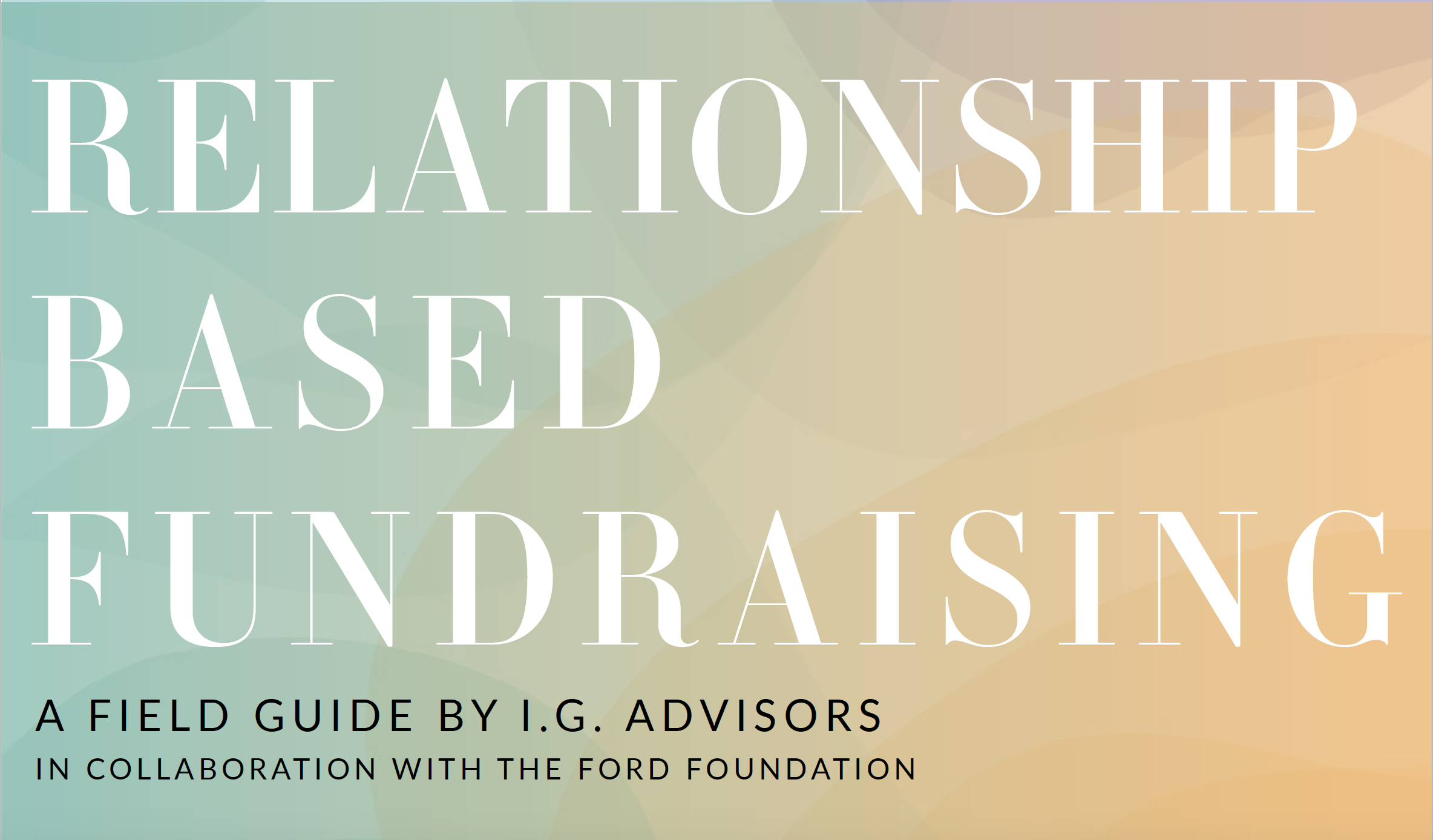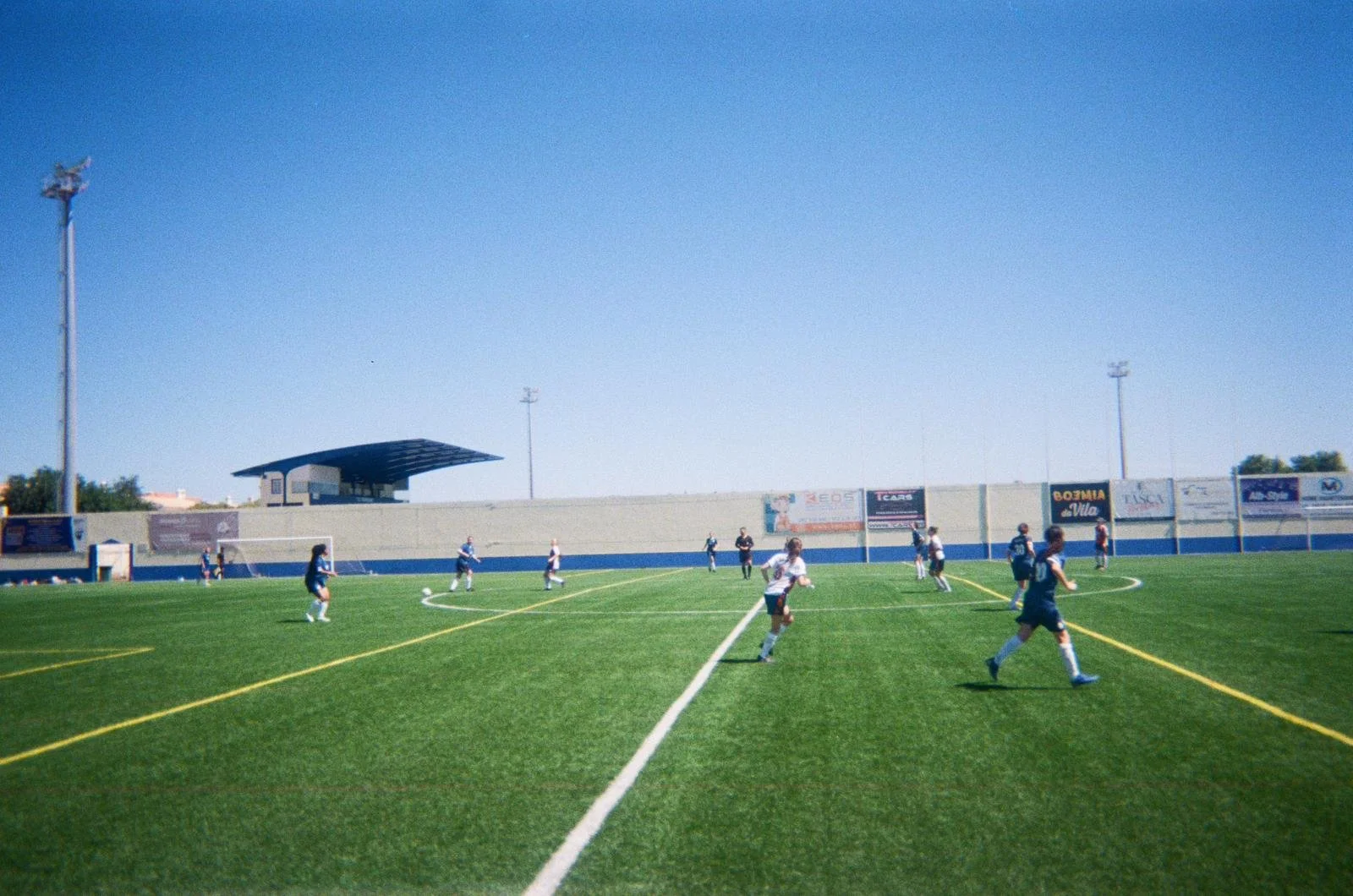What Fundraisers Want
Insights from I.G.’s Field Guide to Relationship-Based Fundraising (available for free download here)

Relationship-based fundraising. The more we speak to non-profits dealing with changes stemming from Covid-19, the more we understand how vital it is to master this.
This year, in partnership with the Ford Foundation, I.G. created a free Field Guide to Relationship-Based Fundraising, designed for — and with — fundraisers around the world. The Guide is an accessible fundraising toolkit, with activities, case studies, tools and best practice templates to help organisations build strong relationships with high-value audiences such as Trusts and Foundations, Governments, Multilaterals, Corporates, and High-Net-Worth Individuals.
What struck me most when we spoke with more than 25 organisations across Asia, Africa, and Latin America during the design process was that — no matter their size or location — non-profits face very similar challenges, and need very similar support from their donors. Here are the top five things fundraisers said they want:
More Unrestricted Funding
Non-profits want to be more flexible and autonomous with how funds are spent to create impact. They also want to spend less time reporting and accounting, and more time actually focusing on delivering their programmes. But how do you secure unrestricted funding, especially when you don’t know the donor well? Check out Section I, Part B of the Guide for our recommendations.
A Diverse Income Portfolio
Non-profits want to diversify their donor portfolio to build a sustainable range of income streams. However, when you are used to fundraising from specific donor audiences, how do you expand your practice beyond this? We know this can feel daunting, as it means playing the ‘long game’, where the return on investment is not immediately obvious. Designing a fundraising strategy to include new target audiences needs to be backed up by thorough and evidence-based research to assess its feasibility before implementation. Check out Section I, Part A of the Guide for more guidance on how to conduct strategic research.
Expanded Team Capacity
Capacity is a sore spot for most non-profits, particularly small- to medium-sized ones. Fundraisers around the world share the same feeling: there’s always too much to do, and not enough people (or time) to actually do it. In some cases, they lack specific skills; in others, they just don’t have the time or resources needed to complete specific tasks. But how do you choose what activities to prioritise when everything feels urgent and vital? Check out Section II, Part A of the Guide for more guidance.
Supportive & Authentic Communication With Donors
Donors can be extremely different from one another. Even when dealing with the same type of audience, individual preferences are what ultimately determines the ‘rules of engagement’. We’re often asked for the most effective way to communicate with donors — and while there are certainly best practice tips, the key to effective (and efficient) communication is understanding what each individual donor wants, and balancing that with the boundaries of what you can provide. Check out Section I, Part B for more communications guidance.
A Stronger Network of Donors
The majority of funding for non-profits doesn’t come from searching online requests for proposals (RFPs). More often than not, opportunities are generated through relationship building. But how do you start building a network when you don’t have an existing one? According to the ‘six degrees of separation’ rule, we are only six (virtual) handshakes away from each other! Check out Section II, Part B of the Guide for recommendations on how to bridge this gap.
From the many conversations we’ve had with non-profits, it’s clear many think relationship-based fundraising is an ‘art’, which cannot be taught. While a good part of this ‘art’ is unquestionably intuitive, fundraising is also a ‘science’, which can indeed be taught — and this is exactly why we created our Field Guide. You can download the full Guide (or individual sections) here. We’d love to hear your thoughts!
PS: Do you want to learn more about what fundraisers want? At I.G., we work closely with both small and large non-profits, and are very familiar with the sector’s needs and challenges (many of us have been fundraisers, too). If you haven’t heard it yet, one episode of our very own podcast, What Donors Want, is entirely dedicated to What Grantees Want.
As we close the chapter on 2024 and step into a new year, our Advisor, Harriette, finds herself reflecting on what’s needed to move philanthropy forward in 2025.
It’s not a groundbreaking revelation that staff wellbeing and burnout are huge challenges our sector is facing right now, and the sector-wide lack of investment in professional development has a lot to answer for.
Our Associate Advisor Charly makes the case that greater investment in your grantmaking team = greater impact for your organisation, and beyond.
While philanthropy and football may seem worlds apart, I’ve started thinking about the many similarities that can provide valuable lessons for those in the philanthropic sector. I for one, am always learning about the essential elements of football that can inspire and inform effective philanthropy.
Through the power of collective design, our fundraiser and grantmaker #FixTheFlow Fellows have imagined the future of our philanthropic funding system, and we should all listen carefully.
In the coming months, our Associate Carli is exploring the complexities of social innovation and will share her learnings, insights, and questions with you.
I.G.’s CEO Emily shares some of the mistakes and challenges she found during her leadership journey, and what she learned and will share in I.G.’s new Leadership Lab.
I’m expected to show up as a leader, but don’t feel like a leader. Introducing Impact & Grow: A Leadership Lab.
Leveraging Limited Funds For Humanitarians: Insights from the 2024 #HX24 conference, organised by Save the Children UK and the Humanitarian Leadership Academy.
Social enterprises have a particularly interesting relationship with Monitoring, Evaluation and Learning (MEL) as they need to capture both the financial and social/ environmental impact of their work, and speak to a wide range of potential funders and investors. Caitlin McLoughlin chatted to Abhinav Khanal, Co-Founder and Executive Director of Bean Voyage, to explore this further.
Image Credit: Bean Voyage
A round up of everything the I.G. team did in 2023!
Introducing a new, dedicated funders stream to I.G.’s #FixTheFlow Fellowship! We’re accepting applications until 17th November (for a 2024 start). Join our movement at fixtheflow.org
Join us for one (or all!) our eight workshops in our Autumn Training Series, where we will cover some of the trickiest topics facing fundraisers today.
What does meaningful and effective learning actually mean in practice?
Our Advisor Caitlin interviews Kore Global’s Emily Boost on learning how to learn and all things feminist evaluation and learning.
How do we balance our passion and our desire to give our best, whilst not being consumed by failure to live up to our own or others’ expectations?
At I.G. Advisors (I.G.), we’re often approached to design and implement evaluations for our clients to understand the impact of their grantmaking, fundraising or programmatic strategies, and identify opportunities for evolution.
The ‘lone saviour’ approach won’t cut it (and it also might destroy you).
It’s hard to believe it now that we’re living through a polycrisis, but the financial crisis and Great Recession of the 00s felt like a once-in-a-lifetime jolt to the world order at the time.
What you can learn from others leading philanthropic networks like yours
‘Well, we could have called that one.’
I.G. Advisors (I.G.) recently had the pleasure of collaborating with The Big Give and Rosa on the Women and Girls Match Fund.
Being a parent is often a thankless task. You take something and nurture it, treating it with love and care, losing sleep and worrying if — against all odds — , it will achieve its full potential and become the best it can be. It may never, ever show gratitude for your sacrifice. And then one day it will grow up and leave.
New I.G. Insights report explores how fundraisers and funders can support digital fundraising for racial justice issues.
#TaxPhilanthropy — wealth holders have the power to pay more tax right now even if governments fail to reform their policies
How starting small might be the most effective way to change the world.
An insight into “Modern Grantmaking: A Guide for Funders Who Believe Better is Possible”
A couple of weeks ago, I.G. brought back its much-loved book club event for our first in-person get together in over a year.






























